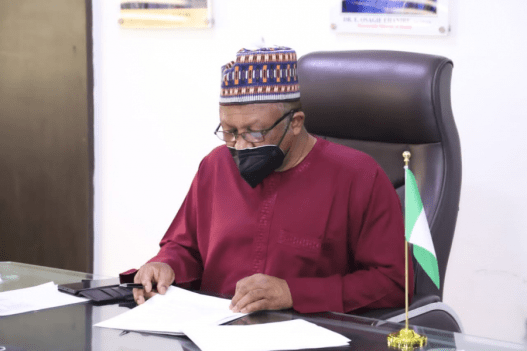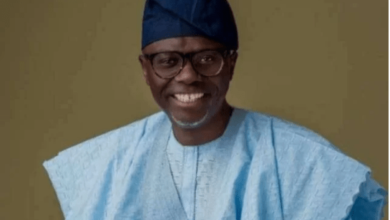Healthcare’s shared responsibility by federal, states, local govts — EHANIRE.

By G9ija

Dr. Osagie Ehanire, a medical expert and surgeon, has been presiding over Nigeria’s health system, first, as minister of state from 2015 to 2019 and later as minister from 2019 till date.
Under his leadership, Nigeria successfully steered through the stormy waters of COVID-19 with minimal deaths when many developed nations with better facilities and health personnel lost millions of people to the pandemic. According to Dr. Ehanire, the lessons from the pandemic have helped Nigeria reshape its health system and prepare it for emergency response going forward.
In this interview with Northern Region Editor, Soni Daniel, and Health Correspondent Erunke Joseph, the health minister says that Nigeria has made progress in the healthcare system through some policies and programmes embarked upon by the Buhari administration.
Excerpts:
WHAT have you been able to do to add value to the Nigerian healthcare system since your appointment as a minister?
Well, I can say that I have been able to do many things and initiate many new projects and programmes. You know that the health system was tested by the COVID-19 outbreak, which caused a shock around the world, affected more than 65 million people, and led to the death of more than 6.5 million people around the world.
Note that even though our own system was also impacted, we were not as badly impacted as others. The basic principles of what you want to do if you become a minister of health in a developing country are to realise first and foremost that health is a cornerstone of human capital development.
If you have a good health system, you have laid the groundwork for economic productivity, population health, and all the benefits that come with it, and that will go into about two or perhaps three components.
First, there is universal health coverage, which ensures that no one is left behind and that the majority of the population, at least 90% to 95%, has access to some form of healthcare, usually the most basic.
That means that they should be able to have somewhere to go when they are sick. And the second part of what you do in the health sector is to improve the quality of care. Are people getting quality? Are they getting better attention and better medicine? And finally, the response to public health is also important.
This is because public health security needs to be guaranteed, no matter how strong your health system is. When something like Ebola or COVID-19 breaks out, the country must have the ability to respond swiftly to it. So those three main pillars are the pillars on which the health system works.
So looking at the three pillars you have enumerated, how has Nigeria fared today?
We have fared fairly well. The greatest challenge, of course, is that building or working on these pillars, is not something one person or one ministry can accomplish in one day. You are aware that health is a shared responsibility of the Federal Government, state and local governments, and even communities, because the uptake of health services and community cooperation with those attempting to establish formal health care is critical, and thus advocacy – making people understand what you want and making the various tiers of government work with you – and even non-governmental organisations – corporate bodies – are important.
And, if you are not all working in harmony, you don’t get as much done as you would like to, and sometimes you might even find yourselves working at cross purposes or duplicating. So that part of it has been a challenge to overcome, but we did make some progress in that respect, especially in getting people to work with us.
So we have expanded universal health coverage, and as you know, Mr. President began providing resources for the basic health care provision fund, which is to offer health care and better access to health care to the poor and vulnerable.
The president also signed into law, the National Health Insurance Authority Act, which now makes health insurance mandatory, and we are working on setting that one up. All of that will expand the physical space for health. And we are also pushing to make health care available. Before you can offer universal health coverage, the health structures must be there, and the closest ones to any community are the primary health care centres.
Now, in the cities, you don’t have too much of it, but there are many private hospitals, private entities, and private clinics around. But once you step out of the urban areas, it is a different subject, people are left on their own, and that is where the primary health structure comes in, where the government of President Buhari has the policy of one primary health care centre per ward.
Since the beginning of this administration, we have redefined that primary health care center. A primary healthcare centre is to be provided with a staff quarter at the back so that staff can reside there and be able to work in three shifts, and those shifts will make sure that there is somebody to attend to you day or night, at any time.
This is different from the situation in the past, where you had a centre that would open by 9 a.m. and close by 5 or 6 p.m., and then if you had a problem after that, you were on your own. So this one is to have all the facilities, and if you are going to be offering services by night, the most reliable source of energy is solar power.
The design we have makes provision for enough solar panels to provide them all the light they need overnight, and then, of course, the water supply, because without water, there is no clinic. So that is the new design, and we are getting all the old designs raised to this standard; many of them don’t need to be built afresh, they only need to be updated, and we are getting people interested in it.
But is there any such comprehensive primary health centre working anywhere in Nigeria as of today?
Oh, yes, there are many that have been completed and are working. There are some in Kaduna and Edo states, but what we are looking for now is for people to key into this. Unfortunately, there are people who don’t find this one very attractive because they want those with bigger structures that they can show off in order to get more political capital.
But we are encouraging people to understand that this is the most important level of health care, this is where we reach the largest number of citizens; we want to cover 90 to 95 per cent of the population, and we are beginning with this one. We are also working to upgrade the secondary health care system, which is to have one general hospital per local government.
The general hospital at the local government will be the referral point for cases coming from primary health care centres, while they will be responsible for a cluster of primary health care centres.
However, because of the manpower shortage, we have a plan to bring consultants from teaching hospitals and federal medical centres to general hospitals to provide support and consultancy services. Their salary is already paid at the federal level; they just support the state. So we are encouraging the states to renovate the general hospitals, to revive them, so people don’t have to go from primary health care and look all the way to the teaching hospital in town.
The transport cost is too high, the hazards are too many, and the general hospital can take care of most of the cases, the referrals, the minor and middle level operations, for example, like consulting and specialty services.
So getting everybody to key into this system is not very easy because people have their own ideas and they carry them out irrespective of what the plan is, but we are making some progress on that and maybe there is now an inclination to have a Federal Medical centre in every ward.
The policy right now is to have one FMC or teaching hospital in every state. However, we are attempting to establish a FMC in each senatorial zone, and I believe we will incorporate this into policy, and where there is no teaching hospital, we support tertiary health care in each senatorial zone.
And we are also developing what we call specialty hospitals that focus on particular areas; take, for example, the orthopaedic hospital, the psychiatric hospital, the eye hospital, etc. And to tie all of these together, there is the National Emergency Medical Service and Ambulance System, which we are working on building up and which is already being piloted in Abuja and soon to be piloted in four other states.
What does that entail?
It is a system that will provide emergency services to accident victims and others in emergency situations. It will have a specialised telephone line to be provided by the National Communications Commission, and the call will be automatically relayed to either the medical, police, or fire services for immediate response to any emergency situation. So those three emergency services are relayed at that point.
So the medical side now goes to a system that we are setting up in every state that will now mobilise an ambulance from participating hospitals. Those are the government hospitals, state hospitals, and some private hospitals that are participating, which will be accredited and have their own emergency service centres, where they can see patients and a first aid team that goes out to answer the call.
The movement of the ambulance will be monitored, and then payment will be made to the ambulance for every round they do; the patient is not the one going to pay, and the service will save lives and take patients to hospitals that are already dedicated and ready and waiting for them.
What strategy did the Federal Ministry deploy to prevent mass deaths during the COVID-19 pandemic that affected millions of people in other parts of the world that are blessed with even better health facilities and personnel than Nigeria?
That was a mixture of many factors. We were faster on our response than most other countries with regards to monitoring entry into the country. We were among the first countries in the world to begin checking because if there was an outbreak of disease anywhere, such as COVID-19, the likelihood was that it would be brought in by air, not by someone walking across the border or arriving by ship.
That’s why we kept an eye on the airport and anyone entering Nigeria. Right from day one, we were screening the entry at every point, screening where passengers boarded and where they were coming from, and we recorded a few cases of those who came in from China and tracked them to their houses and monitored them, seeing that they were okay before we left them.
So we were very quick. We found the first case around the 27th of February; it was an Italian man. We were all looking for a Chinese, thinking it would be a Chinese because the outbreak started in China.
But there were others, like Nigerians, who were coming in that we could not stop but we had to track. I must commend the Lagos State government because most of them came through Lagos, and we were able to set up a very rapid response team led by the Lagos State Health Commissioner, who worked very well with us.
We also sent out teams to find out who had symptoms, monitor their temperature, and watch them until they were well before we left them alone. Through that method, we were able to get the Italian man who was the first case, and we tested him and he was positive, and then we started tracking every single contact that he had had and established that he had contact with only one other person who had also been infected, and both of them were monitored.
But on the whole, let us say it was a quick response and a dedicated response triggered by fear, knowing that we were not very strong and therefore needed to be fast and move faster than the others.
Is there any lesson Nigeria learned from COVID-19 in terms of preparedness? emergency response?
Yes, very many lessons. We have already studied and documented them, and we are already implementing some of them with the support of the United Nations. We are in what they call the ‘surge project’ which now prepares a team in every state. We are doing a pilot study in six states, and in every state we have a surge team that will be able to know when there is an outbreak and then sort it out.
The team will go around finding those who suffer from that disease outbreak, make a report, and prepare a response. There have also been a lot of benefits that have come out of the entire exercise. For example, there was a huge need for oxygen during COVID-19, and the government under President Buhari was very fast in approving 38 new oxygen plants, which made it possible for each state to have one while Lagos has two because of its huge COVID-19 cases.
Nigeria also received 37 additional oxygen plants from an international agency, allowing us to have the most oxygen-generating plants in history. That has brought the total number to 120 oxygen plants, which will enable us to make one for every senatorial district, while others will go to general hospitals in the states. So we are working on an MoU with the state governments because they have to go monitor how they use the oxygen plants, how to produce and market it to the private sector and ensure that there is oxygen sufficiency across the country.
Another advantage is that we now have molecular laboratories, PCI laboratories, at least one in each state; most states have two, three, or four because we have grown from three to 80 states; we have isolation centres in every state; and we even have ICUs specifically for infectious diseases in every state.
What would you identify as the major achievements of this administration in the health sector under your leadership?
In the health sector, I will say there are many key achievements, among them the introduction of the Basic Healthcare Provision Fund and the establishment and emphasis on universal health coverage. We are also working to create an improvement in access, and part of the improvement in access is emergency medical service, which has never existed in this country before in a formal sense.
So, in an integrated national sense, we now have a national emergency medical service and ambulance system, allowing you to enjoy the luxury that developed countries enjoy.But one very important feature is the Presidential Health Reform Committee, which is to reform the way we manage our health to make it more efficient, more cost-effective, and more productive in order to allow the doctors and nurses to work more and to earn more while doing more work.
So we are looking at being able to have performance management so that doctors and nurses who are ready to work hard will also be paid very well rather than giving everybody a blanket salary and then saying, “Go and work,” and then after a few years they promote you to one level or another. That does not seem to work very well for professionals.
What is the state of our teaching hospitals and other tertiary health facilities across the country? Are they able to meet the expectations of Nigerians?
We have very good doctors, and they are skilled and very well trained. I will say that I have confidence in our doctors and nurses. But we must provide a conducive environment for them to work. We need a clean environment; we need dignity for our workers, and we need dignity for the patient.
And the opportunity for every person to express his own wish and also to work as hard, there are doctors who are ready to come to work at 8 a.m. and leave at 6 p.m. without breaking, but you must also give them the corresponding remuneration. So if you do that, you will notice significant changes.That is what happens in developed countries.
The teaching hospitals and FMCs have received a lot of upgrades since this administration came into office in 2015. They have access to many pieces of equipment, more funding, and some now have intensive care units, isolation centres and oxygen tanks. And one other thing we are trying to do now is to connect Nigerian medical experts in the diaspora with Nigerians who are here so that they can get cutting edge skills and be able to operate with more confidence.
The impression we have is that Nigerian doctors have left in droves and that the health system is at the verge of collapsing. From your assessment as a doctor, is Nigeria in danger over the exodus of doctors, and what is the real number that has left?
Well, we need to look at that from many points of view. First, Nigerian universities are producing about 3,000 doctors every year, and about 800 or 900 are returning home from training overseas every year. That is nearly 4,000.
Our estimate is that about 1,000 are leaving. So actually, we have more fresh doctors than consultants and senior doctors in the country. But as far as the numbers are concerned, many of the doctors do not have jobs as there is unemployment among doctors.
But if you look at the teaching hospitals, many of the experts at the higher level do not have job satisfaction, and the organisations do not give them the latitude to express themselves, to work as they want to work, and to earn as much as they want to earn; so they leave.
So the ones we are losing are the high-end, specialised doctors. And then again, it is a government hospital, so the civil service structure has to kick in and go through a lot of laborious steps to replace those who are leaving. So if we could replace them more easily, it would not be so obvious that anyone is leaving.
So we are working in three ways. First and foremost, to improve the remuneration package for expert doctors and to provide opportunities for them to work and earn as they wish.
Second, we are attempting to streamline the processes by which any doctor, nurse, or pharmacist who wishes to leave can be immediately replaced.





